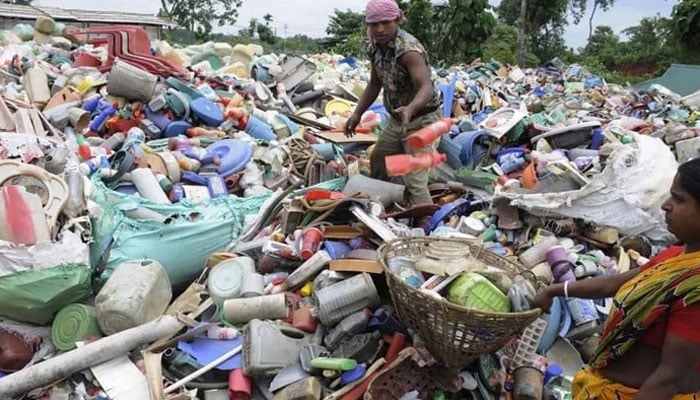How to reduce resource wastage
LAHORE: Contrary to the popular opinion, Pakistan is not a resource-starved country. However, it certainly is one of those countries that use their resources inefficiently, creating undue shortages due to corruption and mismanagement.
Pakistan’s resource crunch has been exacerbated by its unwarranted wastages, including electricity transmission losses, gas losses due to inefficient appliances, water losses in the absence of conservation methods, and post-harvest losses in agriculture.
Pakistan could improve its growth rate without any foreign assistance if the above losses are brought down to reasonable levels. Improvements in many of these cases would not necessarily require cash but only prudent, effective and transparent regulators. Where investment is required, the amount is likely to be many times lower than adding further capacities.
There is an acute shortage of natural gas in the country, particularly during winter when domestic consumption almost doubles. Gas distributors and regulators are fully aware that most domestic gas appliances have only 25 per cent efficiency, which means that 75 per cent of the gas used is wasted. If these appliances, especially gas room heaters and geysers, are standardized by regulators there would be no need for gas load shedding during winter.
Industrial production will also not suffer if industries install efficient gas generators that could produce two times more power than the currently installed generators. This would increase exports and there would be no requirement of government funds. The need to import expensive gas would appreciably decline.
Efficient water conservation techniques would not require even one-tenth of the amount needed to build a mega dam. This does not mean that new dams are not needed. We can plan new dams to stop the waste of an average of 32 MAF of water and start these projects when resources are available.
However, water availability would increase by at least 30 per cent if all irrigation canals are lined.
There would be 30 per cent less use of water in farms if fields are levelled with laser levellers for which few billion would be needed. This could help the country increase its cultivation area by 20-30 per cent and increase agricultural productivity.
Average distribution and transmission losses in federally controlled grids are over 25 percent mainly due to power theft and the poor management of transmission systems. If system losses are brought down to the internationally accepted level of 8.0 per cent, cash flow would increase by 12 per cent, reducing the regular increase in circular debt.
Post-harvest losses in Pakistan account for at least 30 per cent of wastage in vegetables and fruit, and 7-8 per cent in food grains like rice and wheat. Most post-harvest losses are due to faulty storage and packaging. Farmers lose billions in post-harvest losses and the nation risks its food security because of these losses, which could easily be controlled through prudent regulations.
For instance, agricultural experts have recommended that instead of stuffing 100-125kg potatoes and onions in jute bags, regulations should be enacted to pack them in 50kg arable plastic net bags to reduce losses. Similarly, farmers should be provided with small tin silos of 1500-2000kg to store grains, a practice that has been promoted by the Food and Agriculture Organization in many developing countries.
Experts say prevention of these losses could increase productivity, efficiency and foreign exchange savings to the tune of over $6 billion annually and boost the economy without any foreign assistance.
-
 Record Set Straight On King Charles’ Reason For Financially Supporting Andrew And Not Harry
Record Set Straight On King Charles’ Reason For Financially Supporting Andrew And Not Harry -
 Michael Douglas Breaks Silence On Jack Nicholson's Constant Teasing
Michael Douglas Breaks Silence On Jack Nicholson's Constant Teasing -
 How Prince Edward Was ‘bullied’ By Brother Andrew Mountbatten Windsor
How Prince Edward Was ‘bullied’ By Brother Andrew Mountbatten Windsor -
 'Kryptonite' Singer Brad Arnold Loses Battle With Cancer
'Kryptonite' Singer Brad Arnold Loses Battle With Cancer -
 Gabourey Sidibe Gets Candid About Balancing Motherhood And Career
Gabourey Sidibe Gets Candid About Balancing Motherhood And Career -
 Katherine Schwarzenegger Shares Sweet Detail From Early Romance Days With Chris Pratt
Katherine Schwarzenegger Shares Sweet Detail From Early Romance Days With Chris Pratt -
 Jennifer Hudson Gets Candid About Kelly Clarkson Calling It Day From Her Show
Jennifer Hudson Gets Candid About Kelly Clarkson Calling It Day From Her Show -
 Princess Diana, Sarah Ferguson Intense Rivalry Laid Bare
Princess Diana, Sarah Ferguson Intense Rivalry Laid Bare -
 Shamed Andrew Was With Jeffrey Epstein Night Of Virginia Giuffre Assault
Shamed Andrew Was With Jeffrey Epstein Night Of Virginia Giuffre Assault -
 Shamed Andrew’s Finances Predicted As King ‘will Not Leave Him Alone’
Shamed Andrew’s Finances Predicted As King ‘will Not Leave Him Alone’ -
 Expert Reveals Sarah Ferguson’s Tendencies After Reckless Behavior Over Eugenie ‘comes Home To Roost’
Expert Reveals Sarah Ferguson’s Tendencies After Reckless Behavior Over Eugenie ‘comes Home To Roost’ -
 Bad Bunny Faces Major Rumour About Personal Life Ahead Of Super Bowl Performance
Bad Bunny Faces Major Rumour About Personal Life Ahead Of Super Bowl Performance -
 Sarah Ferguson’s Links To Jeffrey Epstein Get More Entangled As Expert Talks Of A Testimony Call
Sarah Ferguson’s Links To Jeffrey Epstein Get More Entangled As Expert Talks Of A Testimony Call -
 France Opens Probe Against Former Minister Lang After Epstein File Dump
France Opens Probe Against Former Minister Lang After Epstein File Dump -
 Last Part Of Lil Jon Statement On Son's Death Melts Hearts, Police Suggest Mental Health Issues
Last Part Of Lil Jon Statement On Son's Death Melts Hearts, Police Suggest Mental Health Issues -
 Leonardo DiCaprio's Girlfriend Vittoria Ceretti Given 'greatest Honor Of Her Life'
Leonardo DiCaprio's Girlfriend Vittoria Ceretti Given 'greatest Honor Of Her Life'




